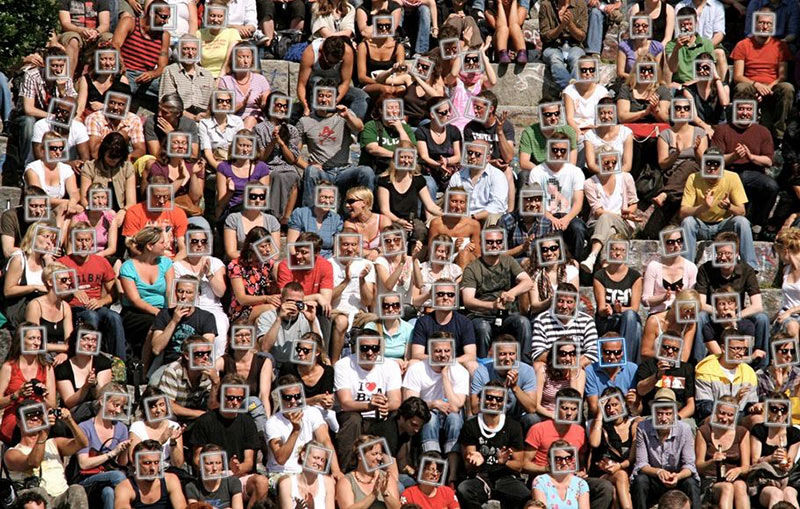
Amazon is actively courting law-enforcement agencies to use a cloud-based facial-recognition service that can identify people in real time, the American Civil Liberties Union reported Tuesday, citing the documents obtained from two US departments.
The service, which Amazon markets under the name Rekognition, can recognize as many as 100 people in a single image and can compare images against databases containing tens of millions of faces. Company executives describe deployment by law enforcement agencies as common use case.
“Cameras all over the city”
Rekognition is already being used by the Orlando Police Department and the Washington County Sheriff’s Office in Oregon, according to documents the ACLU obtained under Freedom of Information requests. Both agencies became customers last year. The entire list of returned documents is here.
Emails and other documents show that Washington County has a database of more than 300,000 mugshots that is indexed by Rekognition. The county obtained a mobile app that allows deputies to query the database by submitting images.
Amazon, meanwhile, is offering free consulting services to build a proof-of-concept implementation of Rekognition for Orlando police. The city’s police chief has praised the arrangement as a “first of its kind public-private partnership.” The ACLU cited this presentation in which an Amazon executive said Orlando officials “have cameras all over the city” that submit images that Rekognition analyzes in real time to track “persons of interest.”
In a post published Tuesday, ACLU officials wrote:
With Rekognition, a government can now build a system to automate the identification and tracking of anyone. If police body cameras, for example, were outfitted with facial recognition, devices intended for officer transparency and accountability would further transform into surveillance machines aimed at the public. With this technology, police would be able to determine who attends protests. ICE could seek to continuously monitor immigrants as they embark on new lives. Cities might routinely track their own residents, whether they have reason to suspect criminal activity or not. As with other surveillance technologies, these systems are certain to be disproportionately aimed at minority communities.
The ACLU and more than two dozen other civil rights organizations called on Amazon CEO Jeff Bezos to stop selling face-recognition services to government agencies. “We demand that Amazon stop powering a government surveillance infrastructure that poses a grave threat to customers and communities across the country,” officials from the ACLU, Electronic Frontier Foundation, Freedom of the Press Foundation, and Human Rights Watch wrote in a letter. “Amazon should not be in the business of providing surveillance systems like Rekognition to the government.”
In a statement, Amazon officials wrote:
Amazon requires that customers comply with the law and be responsible when they use AWS services. When we find that AWS services are being abused by a customer, we suspend that customer’s right to use our services. Amazon Rekognition is a technology that helps automate recognizing people, objects, and activities in video and photos based on inputs provided by the customer. For example, if the customer provided images of a chair, Rekognition could help find other chair images in a library of photos uploaded by the customer. As a technology, Amazon Rekognition has many useful applications in the real world (e.g., various agencies have used Rekognition to find abducted people, amusement parks use Rekognition to find lost children, the royal wedding that just occurred this past weekend used Rekognition to identify wedding attendees, etc.). And the utility of AI services like this will only increase as more companies start using advanced technologies like Amazon Rekognition. Our quality of life would be much worse today if we outlawed new technology because some people could choose to abuse the technology. Imagine if customers couldn’t buy a computer because it was possible to use that computer for illegal purposes? Like any of our AWS services, we require our customers to comply with the law and be responsible when using Amazon Rekognition.
In an email, an Orlando Police Department representative described the department’s use of Rekognition as a “pilot” to see if the service works as Amazon describes. So far, the city has provided facial imaging for only a “handful” of officers who volunteered to participate in the test. Additionally, Rekognition has access to only eight city-owned cameras.
“We are always looking for new solutions to further our ability to keep the residents and visitors of Orlando safe,” Sergeant Eduardo J. Bernal wrote in the email. “Partnering with innovative companies—like Amazon—to test new technology is one of those innovative ways and how we will continue to ensure we offer the best in tools, training, and technology for the men and women who serve our community to do the best job they can, with the best resources available.”
Representatives for the Washington County Sheriff’s Office didn’t respond to a phone message seeking comment.
reader comments
106